Video: Cornish potato grower battles rising costs and tricky planting
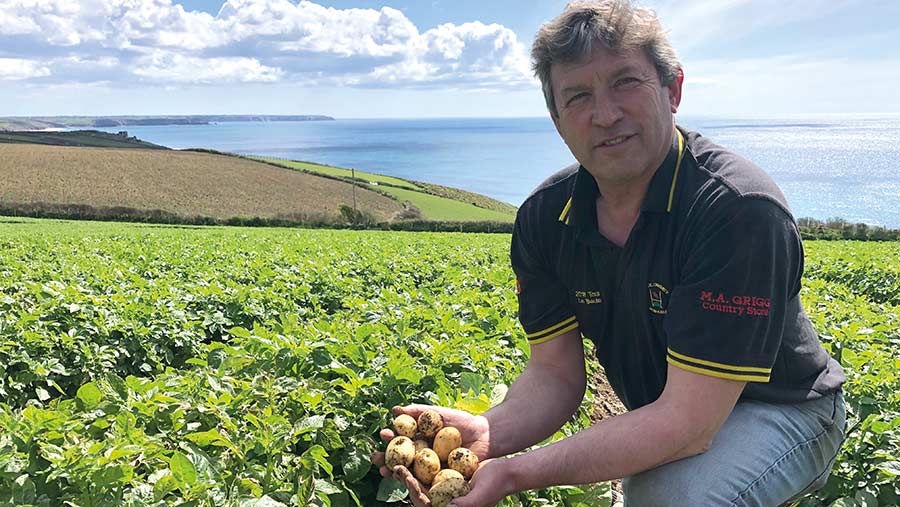 Phil Rogers © MAG/Emma Gillbard
Phil Rogers © MAG/Emma Gillbard Costs are up more than 20% for Cornish salad potato grower Phil Rogers, in a showery planting season which has required further costly cultivations to ensure perfect seed-bed conditions.
Two thirds of potato planting is complete at Pengelly Farms, based near Helston, where production costs are up 20.5% while salad potato market prices have risen only 10-12%.
“With the current labour climate, and diesel and fertiliser bills rising, it really is expensive going at the moment,” says Mr Rogers.
See also: Peas increase wheat yields and lengthen OSR rotation
As inflation bites, farmers are under significant cost pressure, with many looking to insulate their business against escalating costs.
Fortunately, the use of digestate from the farm’s anaerobic digestion (AD) plant has helped offset some of the rise in fertiliser costs, while the use of farm-saved potato seed has reduced exposure to volatile markets.
Watch the video and read the full report below.
Potato planting
Planting of the 550ha salad potato crop started in January on the lighter sandy loams suited to early planting and harvest. The team will continue planting until mid-May.
Early-sown crops are looking well and are now rapidly approaching harvest, despite battling 100mph wind gusts on the Cornish coast.
Mr Rogers says he is happy with how the earlies have performed, with harvest scheduled for 3 May, ready for the supermarket shelves on 5 May.
However, from March onwards cold and showery conditions have proved challenging.
The past three weeks have been particularly difficult, since moving to a heavier block of land near Truro where soil moisture levels have been higher than usual.
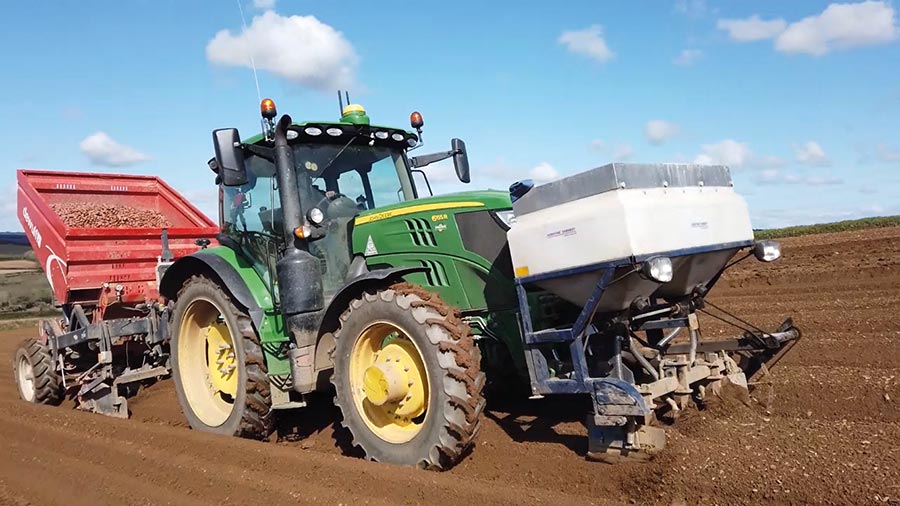
© MAG/Emma Gillbard
This land is getting an extra cultivation pass to help dry soils to achieve perfect seed-bed conditions – something which is absolutely critical for the salad potato market.
“The soil is a bit tacky at the moment,” says Mr Rogers. “We’re having to plough three days ahead and we’re doing an extra cultivator pass to dry the soil out.
“Generally speaking, we would only cultivate the ground once but we’re having to do two passes now.
“Given the greater cost pressure we are already contending with, we could have done without the extra soil passes, but good seed-beds are essential.
“Last season the heavier land was baking in front of the planters, but this year is a completely different story.”
Strategic planting
As salad potatoes are smaller and lower-yielding than maincrop potatoes, establishing them requires a much slower and more strategic process.
Ensuring the perfect seed-bed is critical to maintain optimum potato quality, value and harvest. Some fields are worked in only one direction to maintain optimum planting and harvest efficiency.
Given the more challenging conditions this year, work rates are down 2ha/day from the average 11ha/day.
In total, more than 15,000t of potatoes are produced by the farm each year, destined for most of the big UK retailers, with a proportion sold for export and an additional 40t a week going to the local wholesale market.
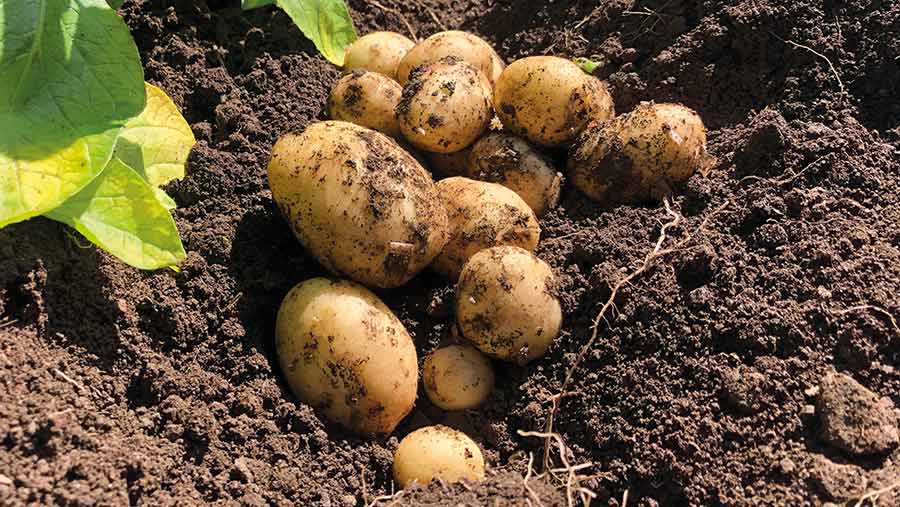
© MAG/Emma Gillbard
Varieties include Paris, which is grown for its good disease resistance against common scab and blight, while the old favourite Maris Peer is grown for its early-season planting traits.
Nutrition
Potatoes receive anywhere between 130kg and 170kg N/ha, depending on the variety, with Maris Peer at the lower limit due to its restricted yield potential.
As nitrogen is already applied to match crop requirements, Mr Rogers says there is limited scope for further fertiliser cost savings without significant yield penalties.
However, rates are tailored back wherever possible, and the use of 20,000cu m of digestate from the farm’s AD plant plays an important role in maintaining crop and soil health.
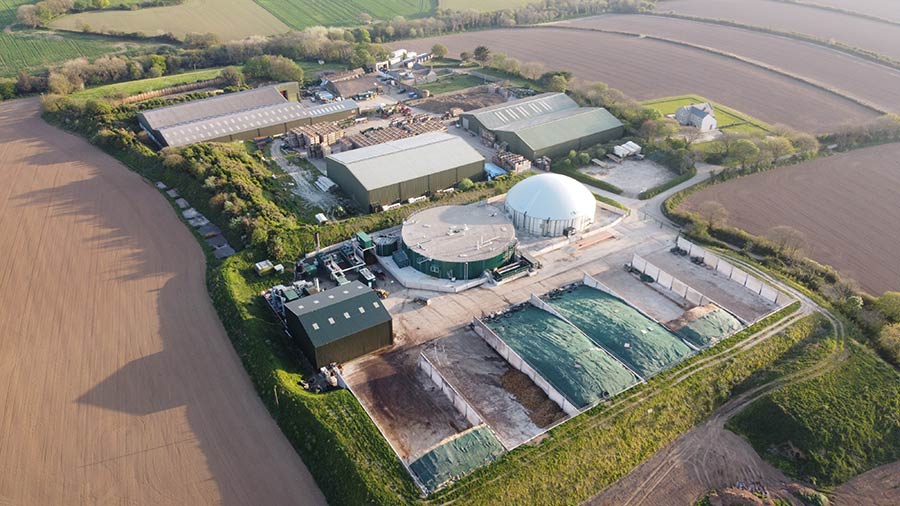
© Pengelly Farms
Digestate is used in a little-and-often approach across all cropped land, reducing artificial nitrogen use by 30% on potato crops grown on the home farm and a further 30% across maize and sugar beet energy crops.
Mr Rogers says: “Digestate has really helped us reduce our fertiliser bills, but transport costs associated with its haulage are high.
“To avoid this as much as we can, we use a drier on the AD plant to remove water from liquid digestate, to produce a pelleted product at 85% dry matter with a high nutrient value.”
Mitigating costs
Additional measures to reduce costs include 250kW of solar panels on the 8,500t capacity cold storage shed, helping to offset farm energy costs which have doubled in the past 12 months.
A further 1,800t of storage is under construction, and Mr Rogers hopes to connect electricity from the AD plant to power these facilities.
Use of home-saved seed also helps insulate the farm against rising costs, volatile markets and limited availability of high-quality seed.
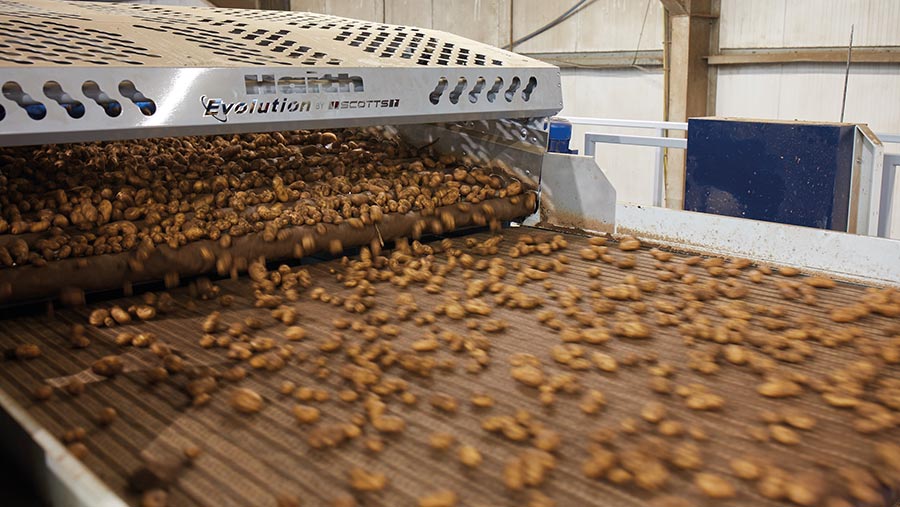
© Pengelly Farms
Last year, the farm invested in a new Haith grading line, capable of sorting crops into six different sizes, with throughput of 40t/hour when grading post-harvest.
The line is kitted out with a Tomra 3A optical sorter which distinguishes between living biomass and unwanted stones and clods – which would otherwise be difficult to separate due to the small size of salad potatoes.
AD plant helps potato rotation success
Pengelly Farms replaced its traditional cereal rotation with a range of energy crops after farmer Phil Rogers established an anaerobic digestion (AD) plant on the farm in 2016.
Capable of producing 1,000kW of electricity, the plant is powered by a range of energy crops including sugar beet, maize, spring barley and rye, all grown on the 1,065ha farm.
The energy crops act as good breaks within the potato rotation, where potatoes are grown either one in six or one in seven years.
Any crops which don’t meet the supermarket grade are fed to the plant as a sustainable way to avoid losses.
Careful rotation choice and digestate applications help maintain soil health, which is paramount to successful potato production. Soils are free of potato cyst nematode, but wireworm populations pose the biggest threat.
Maize and sugar beet crops are established with as little soil movement as possible to maintain soil health ahead of the more intensive potato planting cultivations.
A power harrow was previously used on maize and beet ground but the removal of this pass will save £74/ha, leaving a Simba DTX cultivator working at a depth of 25cm, before drilling with a Vaderstad Tempo drill.

